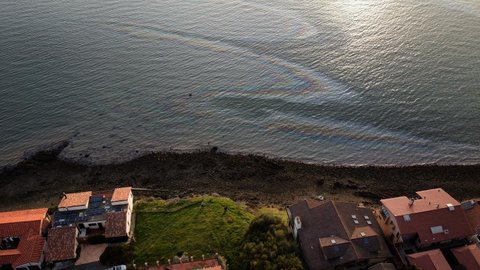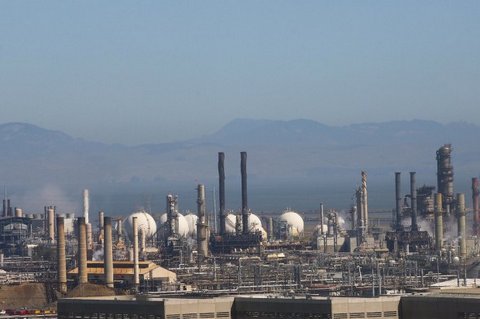
21 Apr Contra Costa Refineries’ Water Pollution Goes Largely Unchecked

Oil from a pipeline leak that bled more than 500 gallons of petroleum product into the San Francisco Bay washes onto the shore of the Point Richmond neighborhood on Feb. 9, 2021. (Denis Perez-Bravo / The CC Pulse file)
By Samantha Kennedy
Four oil refineries stand between Contra Costa residents and their waters. Half of them, including the Chevron Richmond Refinery, are responsible for some of the worst water pollution by oil refineries in the country. This often isn’t illegal, but when it is, there is little to no enforcement.
After a January report by the Environmental Integrity Project detailing the Environmental Protection Agency’s failure to uphold its commitment to the Clean Water Act, a federal act meant to curb water pollution, the EPA has continued to ignore CWA advocates. The EPA announced technical assistance centers to fight environmental injustice and proposed the nation’s first limit on PFAS. Better known as “forever chemicals,” they are long-lasting chemicals thought to increase the risk of cancer. Water pollution regulations for industrial groups, including oil refineries, though, have remained nearly untouched for over 40 years.
But stricter water regulations wouldn’t fix everything.
In addition to EPA rules, states can set their own restrictions on water pollutants. California has some of the stricter water pollutant regulations for oil refineries, but those same refineries still damage the waters surrounding them.
The Chevron Richmond Refinery has waste discharge locations in San Pablo Bay that allow the refinery to get rid of waste within limits set by the state. Chevron is one of the most prolific violators among oil refineries in the country, consistently being in violation of these limits since the end of 2021, but has not faced any enforcement actions in that time.
>>>From the Archives: Chevron Oil Spill Is Under Investigation
The EPA and the state environmental agency, CalEPA, have shown that stricter regulations need to be paired with a widespread appreciation for our waters to have any meaning.
San Pablo Bay is the dumping site for half the refineries in the county, and waste from the other half eventually flows its way. The EPA considers the body of water impaired due to high levels of mercury, other heavy metals and dioxins in the water, which are all waste that oil refineries release.
Chevron and the PBF Energy refinery near Martinez release high amounts of one heavy metal, nickel, which is known to harm aquatic life. According to the EPA, San Pablo Bay isn’t currently suitable to support healthy aquatic life. Other animals outside of the water, such as birds, also are at risk if they eat from the water.
Plans have been put in place to restore bodies of water affected by water pollution, but problems will persist as long as pollution by these refineries continues. Some refineries have proactively addressed pollution concerns to reduce the more harmful pollutants.
In Contra Costa, PBF Energy and Phillips 66 in Rodeo have wastewater treatments specifically to treat selenium, a heavy metal that causes mutations in aquatic life. These treatments have reduced the amount of selenium discharged by the refineries.
Phillips 66, the oldest of the refineries, is also in the process of transitioning into a renewable fuel facility. The transition would reduce water pollution and gas emissions if stricter regulations were adhered to.
It’s promising, but refineries like Phillips 66 already struggle with lenient regulations. Phillips 66 was in violation of the CWA for nearly half the time between 2019 and 2021 and was fined for releasing millions of gallons of partially treated wastewater into San Pablo Bay.
There may not be a reliance on waters protected under the CWA for drinking, but they are just as important to us and everything else we share the Earth with. Instead of waiting for the EPA to put in place stricter regulations for certain industries, attitudes surrounding our waters should be prioritized.



No Comments